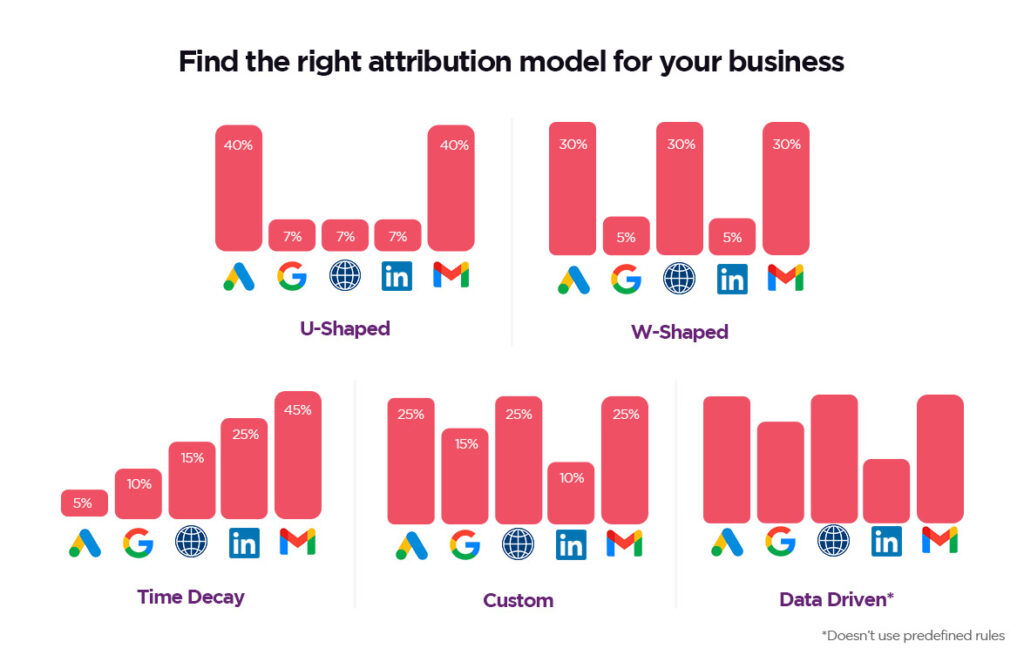Blog
Attribution in marketing is like a well-crafted detective story,each
touchpoint leaves a clue about what led to a conversion. But here’s the
twist: most businesses follow the wrong trail.
If you’re relying on last-click attribution, you might be giving all the credit
to the player who scored the touchdown ,ignoring the quarterback who
threw the pass and the coach who designed the play.

Most businesses still rely on first-touch or last-touch attribution models.
These approaches are flawed because:
Example:
A potential client might:

But if your model only credits the last interaction, you won’t know what
actually influenced their decision.
Discover How Your Attribution Could Improve
Most businesses transition from last-touch or first-touch attribution (i.e.,
single-touch models) to multi-touch attribution, which considers more
than one touchpoint. Analytics platforms like Google Analytics 4 and
Adobe offer some off-the-shelf multi-touch models.
However, while these models are an improvement over single-touch
attribution, they are designed for common business types, such as
eCommerce, which typically have relatively simple sales cycles. As a
result, generic models fail to capture the nuances of businesses with more
complex sales processes, such as those involving offline or phone
touchpoints or high-budget purchases with longer consideration cycles.
Custom attribution models go beyond standard multi-touch attribution by
tailoring the approach to your unique marketing strategy. While multitouch attribution assigns value across multiple interactions, custom
attribution takes it a step further by incorporating:
For example, Google’s Data-Driven Attribution (DDA) is a form of multitouch attribution that uses machine learning to allocate credit
intelligently. However, a truly custom model builds on this foundation by
incorporating your business’s unique dynamics and goals.
Building a custom attribution model isn’t plug-and-play,it requires a deep
understanding of your business and marketing ecosystem. At
MarketLytics, we don’t just track your data,we make sense of it. Our
approach is grounded in multi-touch attribution but customized to your
unique marketing strategy, ensuring:

If you’re wondering how custom attribution could improve your marketing
decisions, let’s talk. Book a free discovery session with our experts and see
how we can optimize your marketing ROI.
Book a Free Discovery Session with Attribution Expert
Q: What is the best attribution model for B2B businesses?
For long sales cycles, multi-touch attribution or data-driven attribution works best.
Q: How do I track offline marketing touchpoints?
By integrating CRM data, call tracking, and QR codes into your analytics system.
Q: Why does custom attribution provide better ROI insights?
Because it aligns tracking with your actual buyer journey, ensuring no touchpoint is over- or undervalued.
Q: Why do standard attribution models fail?
Standard attribution models fail because they oversimplify customer journeys, ignore multiple influential touchpoints, and misallocate marketing budgets. To accurately reflect your real customer journey and better optimize your marketing spend, experts at MarketLytics recommend adopting a custom model tailored to your specific needs:
Q: How can I track offline marketing touchpoints?
Tracking offline touchpoints involves integrating CRM data, using call tracking solutions, and incorporating QR codes. MarketLytics specializes in merging offline and online analytics to provide you with a clear and actionable view of your marketing impact.
Q: What’s the difference between multi-touch and custom attribution?
Multi-touch attribution assigns credit across several customer interactions but uses generalized rules. Custom attribution goes further by adapting the model specifically to your unique business processes, buyer behavior, and marketing strategy,precisely what MarketLytics experts help you build.
Share:

Data that Moves Your Business

Stay ahead with expert insights on marketing analysis, data-driven strategies, and industry trends.

Revenue Growth Analyst
Data Unification Specialist,
previously at a leading
Ecommerce Giant
Discover our latest success stories
and see how innovative strategies
drive measurable results.
Gain clear insights into what’s
driving conversions and optimize
your marketing spend with ease.
Businesses that leverage automated marketing
attribution see a 20-30% improvement in ad
spend efficiency.